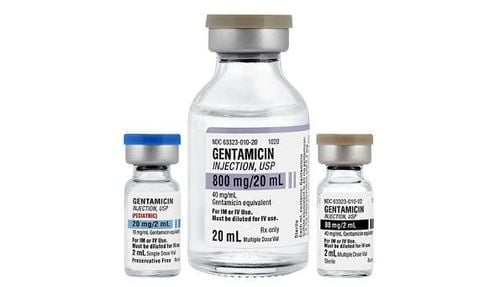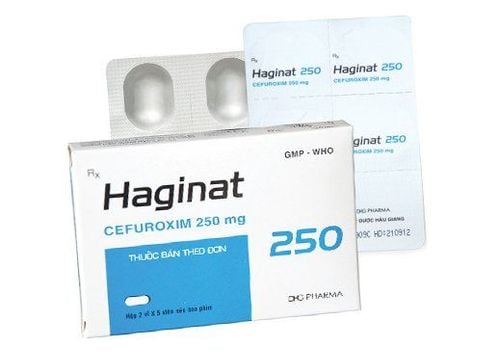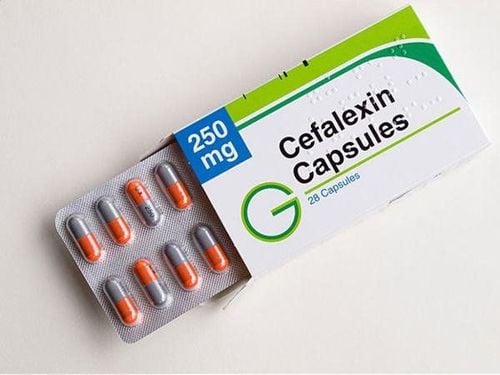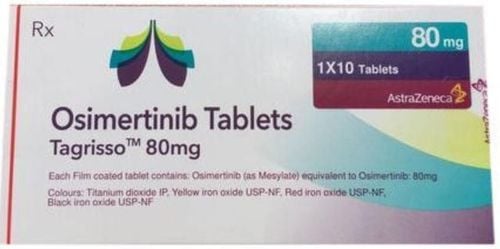This is an automatically translated article.
Clindimax 150mg is an anti-parasitic, anti-infective, anti-viral and fungal drug. Clindimax 150 is commonly used for serious infections caused by susceptible strains of bacteria such as: Escherichia coli, Klebsiella, Enterrobacter, Serratia sp, Citrobacter sp,... and other types of infections.
1. What is the effect of Clindimax 150?
The main ingredients in the Clindimax 150 formula include netilmicin 150mg / 1.5ml as a solution for injection and additional ingredients in the formula such as benzyl alcohol, disodium edetate hydrate, sodium metabisulfite, sodium sulfite driet, distilled water for injection .
Netilmicin is a bactericidal antibiotic, often used in hospitals to treat severe infections when other antibiotics have not been effective. Netilmicin has a rapid bactericidal action, acting by inhibiting the normal synthesis of proteins in susceptible bacteria. Netilmicin will act at low concentrations and against many pathogenic bacteria including Escherichia coli,... From there, Clindimax 150mg can be used to treat patients with serious bacterial infections.
Clindimax medicine 150mg is indicated for use in the following cases:
Infections caused by susceptible strains of bacteria: Escherichia coli, Klebsiella, Enterrobacter, Serratia sp, Citrobacter sp, Proteus sp (indole positive and negative), Pseudomonas aeruginosa, Staphylococcus sp and Neisseria gonorrhoeae. Serious infections caused by Gram-negative bacteria, including those resistant to Gentamicin and Tobramycin, Amikacin, Kanamycin. Bile duct infection. Bone and joint infections. Central nervous system infections. Abdominal infection. Pneumonia caused by Gram-negative bacteria. Sepsis . Skin and soft tissue infections (including burn infections). Urinary tract infections are recurrent, complicated or acute gonorrhea infection. The drug Clindimax 150 is contraindicated by doctors to use with subjects:
Hypersensitivity to netilmicin and other aminoglycoside antibiotics or any ingredients in the drug; Severe myasthenia gravis; Concomitant use with aminoglycoside antibiotics.
2. Instructions on how to use Clindimax 150mg
How to use the drug:
Clindimax 150 flexible ways to use. Clindimax 150mg can be used by intramuscular or intravenous injection. Dosages for intramuscular and intravenous administration will be similar. It is necessary to calculate based on the patient's body weight before treatment.
Intramuscular:
Patients with normal renal function: Adults: Urinary tract infections/systemic infections (not life-threatening): 4-6mg/kg/day divided into 3 equal doses and every 8 hours, 2 doses every 12 hours or once a day. Lower doses are used for urinary tract infections.
For patients weighing 50-90 kg, 150mg every 12 hours or 100mg every 8 hours. For patients outside the above weight range, use the dose in mg/kg body weight minus fat.
Serious life-threatening infections: Increase dose to 7.5mg/kg/day in 3 equal doses every 8 hours. Thereafter, the dose should be reduced to 6 mg/kg/day or less as soon as clinically indicated, usually within 48 hours.
Pediatric patients: Premature or full term infants < 1 week old: 6mg/kg/day (3mg/kg dose every 12 hours).
Infants > 1 week old and children < 7 years old: 7.5-9mg/kg/day (2.5-3mg/kg dose every 8 hours).
Children > 7 years: 6-7.5mg/kg/day (2-2.5mg/kg dose every 8 hours).
Patients with renal impairment : The dose of Clindimax 150mg will need to be adjusted in patients with impaired renal function . Monitor serum netilmicin levels. There is no need to over-compliance with the dosing regimen that will be provided as a guide in the event that netilmicin serum concentrations cannot be measured. When serum concentrations cannot be determined and renal function is stable, serum creatinine levels and creatinine clearance are more reliable and easier to determine indicators. Intravenous:
The intravenous route of Clindimax 150mg can be effective to treat patients with sepsis or shock, patients with congestive heart failure, hematologic disorders, severe burns or those with mass muscle decrease.
The solution can be infused into the patient over a period of half an hour to 2 hours. In some specific cases, intravenous injection may be given for 3-5 minutes.
Adults: Dilute 1 single dose of Clindimax 150 in 50-200ml sterile saline (or 5% dextrose solution in water) Children and infants: the volume of Clindimax 150mg dilution will depend on requirements pediatric patient. For other cases:
Gonorrhea: Recommended intramuscular injection with a single dose of 300mg. Inject into the deep part of the buttocks and each side half the dose. Dose adjustment is required in underweight or obese patients. Uncomplicated, chronic, recurrent urinary tract infections and no evidence of renal impairment: A single daily dose of 3 mg/kg. Hemodialysis patients: Adults with renal impairment: A dose of 2 mg/kg is recommended at the end of each phase of dialysis. Children: Use a dose of 2-2.5mg/kg depending on the severity of the infection. In case of concomitant use of Clindimax 150mg other antibiotics: No dose reduction is recommended for patients with normal renal function or renal impairment.
3. Side effects of Clindimax 150mg
Common (ADR > 1%):
Acute renal failure, polyuria or polyuria, thirst. Muscle spasms, convulsions. Hearing loss, tinnitus, dizziness, dizziness, nausea and vomiting. Uncommon (1% > ADR > 0.1%):
Respiratory muscle paralysis, muscle weakness. Visual disturbances. Lower blood pressure. Increased eosinophils. Hyperglycemia, hyperkalemia and serum transaminases.
4. Be careful when using Clindimax 150mg
Reduce dose depending on age and degree of renal impairment. Do not use too high a dose for the elderly and must monitor renal function. Caution should be exercised in premature and neonatal neonates because of immature renal function and prolongation of the half-life of Clindimax 150 mg may pose a high risk of toxicity. With dehydration, the risk of toxicity in the patient increases. Clindimax 150 should be used with caution in patients with neurological disorders such as myasthenia gravis or Parkinson's, as this drug may worsen muscle weakness because of its cura-like effect on the neuromuscular junction. Sodium bisulfite contained in the injection has the potential to cause allergic reactions, anaphylaxis or asthma in some susceptible patients. Women in pregnancy: Netilmicin in the drug crosses the placenta and can be toxic to the fetus. Considerations should be made in advance in the case of drug use. Lactation: Aminoglycosides may be excreted in breast milk in small amounts, but are poorly absorbed from the gastrointestinal tract and there are currently no data on toxicity to the nursing infant. When using Clindimax 150mg should not drive or operate machinery.
5. Clindimax drug interactions
Concomitant use of Clindimax 150mg with other Aminoglycoside antibiotics or Capreomycin may increase ototoxicity, nephrotoxicity and neuromuscular blockade. In addition, it also reduces the ability of the drug to penetrate the bacterial cells. Co-administration of Clindimax 150 with polymyxin antibiotics (intravenously) increases the risk of nephrotoxicity, unless sensitivity test results show that no other antibiotic combination is available. Clindimax 150 and botalium toxin should not be co-administered as it may increase the effects of the toxin. Concomitant use with beta-lactam antibiotics increases the risk of nephrotoxicity. Renal function should be monitored before and during treatment and dosage adjustment should be made if necessary. The combination of aminoglycosides in drugs and vancomycin in the treatment of bacterial endocarditis caused by streptococci, coryynebacteria and drug-resistant staphylococci may increase nephrotoxicity and ototoxicity. Monitor renal function and monitor drug concentration to adjust dose appropriately. Above is information about uses, dosage and precautions when using Clindimax 150 medicine. To ensure safety for your health and maximize the effectiveness of your treatment, you need to take Clindimax 150 exactly as directed by your doctor.
Please dial HOTLINE for more information or register for an appointment HERE. Download MyVinmec app to make appointments faster and to manage your bookings easily.













